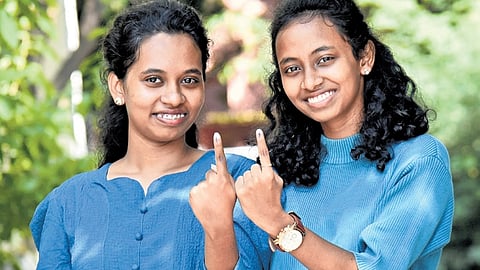

CHENNAI: In electoral politics, young voters hold a distinct sway as they are considered to be the nation’s future. Aware of the demographic’s influence, political parties often attempt to project themselves as ‘youth-centric’ in order to appeal to them. This Lok Sabha election, apart from conversing with young voters on polling day, TNIE recorded the responses of 120 youngsters aged between 18-25 (through controlled circulation of a questionnaire) to better understand the demographic’s priorities while exercising their franchise.
While all the respondents were under 25 years old, 51.3% of them were first-time voters. The survey was taken ahead of the polls and over 80% of them expressed their intention to vote.
A number of them said they will vote for the candidate contesting in their constituency, who includes issues such as job creation, social and economic justice on their priority list. Notably, a majority of young voters highlighted that they do not let religious sentiments influence their voting decisions, and instead go for a more issue-focused approach to politics.
According to the survey results, 40% of the respondents said they prioritise candidates in their constituency, 32.8% said they will consider the candidates’ party affiliations and 26.9% of them said they would simply vote for the prime ministerial candidate.
“I feel that it is better to have governments that are at least in alliance with each other at the centre and state levels. However, it seems such a setting would be difficult given the current situation. So, I consider the merit of the candidates in our constituency and their past performances as well,” said S Preethi, a first-time voter, at a polling booth in Sholinganallur on Friday.
While young voters are said to be susceptible to numerous influences, including their social circles, TNIE’s survey shows that mainstream media has the most impact on their decision-making process. About 48% respondents expressed that mainstream media, including television and newspapers, has played a major role in shaping their voting decisions. 31.9% pointed to social media platforms and 11.8% figured their parents and other family members to be major influences.
Nearly three-fourths of the respondents stated job creation, combating corruption and national security to be significant factors that shape their voting decisions. A majority of 54.4% of respondents asserted that religious matters hold little importance when casting their votes, with 20.2% considering them to be somewhat important and 25.4% stating them to be a very significant factor.
Survey respondents also took a progressive stance regarding social justice and the protection of rights of religious and other minorities, such as the LGBTQIA+ community; 64% of them asserted that such issues are of great importance. Moreover, a whopping 81.6% of all respondents stated that addressing economic inequality is also a crucial factor determining their vote.
When TNIE spoke to voters on election day, a large number of them mentioned the importance of improving the quality of education. “I followed a few campaigns recently that promised freebies, better quality of education, women’s safety and social justice, among others. My pick from the lot will be education, as it is our primary weapon in tackling social inequalities. It is essential to upgrade our teaching methods and also the government school infrastructure,” said Akansha Senthil (22) from Medavakkam, a BTech student who travelled from Bengaluru to south Chennai to cast their vote.
Sneak peek
The survey involved 120 participants aged between 18-25. 51.3% of them were first-time voters. It was carried out ahead of the election and over 80% of them expressed their intention to vote
64% of all respondents found matters of social justice and protection of rights of religious and other minorities to be of importance
81.6% of all respondents said that addressing economic inequality is also a crucial factor determining their vote